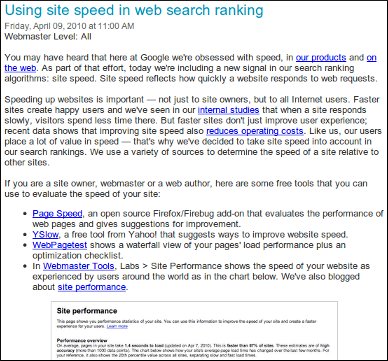Site Speed Officially Used in Search Engine Rankings, Says Google

You’ve probably heard that site speed is now one of the more than 200 factors that Google is using to rank search engine results. The reactions range from, “Everybody panic!” to “This will make it easier for the big sites to stomp the smaller ones,” to “Well it’s about time.” I actually don’t think that most smaller sites are going to suffer because of this change. Sure, the big guys can afford to have their sites hosted on faster, dedicated servers, but some of the worst sites when it comes to speed are sites of big cheeses, particularly those who sell expensive things. You can see in the screen shot the yawn-inducing graphic you have to sit through before you can actually do anything on one such site (a luxury watchmaker). If anything, it will be the sites that are electronic monuments to big egos that are going to suffer most. There are a lot of users like me who see that “Loading, please wait” widget as the perfect reason to click the “Back” button.

If you read Matt Cutts’ blog post for April 9, you’ll learn the reasoning behind Google’s decision, and why Cutts doesn’t think it’s going to be that big a deal. Here’s a recap.
Why Matt Cutts Doesn’t Think It’s Going to Be That Big a Deal
- Your site will depend much more on factors like reputation, relevance, and quality of content, and compared to these factors, site speed will be a relatively small factor in your ranking.
- Less than 1% of queries will change now that site speed is incorporated into the ranking algorithm. In terms of search results, there shouldn’t be a noticeable difference because the average SERP only shows about 10 results.
- Google actually launched this feature a few weeks ago and few people even noticed.
- Google has a whole mini-site dedicated to speeding up your site with plenty of resources and teaching videos about how to do it.
- Small sites are often quicker to respond to this kind of change on the theory that it’s easier to turn around a tugboat than the Titanic.
- And finally, most websites can be made faster with fairly simple fixes, which improves conversion rates and ROI.
Why Some People Say, ‘Oh Yes It Will Be’
Actually, a lot of the hand wringing over this is being done out of not precisely knowing things like how “site speed” is measured. Google isn’t terribly forthcoming about telling people how site speed is figured and weighted, so there are still questions surrounding this new ranking factor, such as:
- Is site speed the time it takes the entire page to load, or is site speed how much time per KB loaded? (Actually, code.google.com pushes their open source tool called Page Speed, which you’ll read more about below. Page Speed evaluates speed as page load time: the time elapsed between the time a user “requests” a page and the time the page is fully rendered by their web browser.)
- How will non-commercial, “passion”-based sites ever make it onto page 1 if they can’t afford a fast server or a web designer with mad skills?
- Will this give the big guys more stomping power since they can afford faster hosting and SEO services?
- Will overseas websites be penalized since their servers are in other parts of the world and may load slowly in the U.S.?
- Will this spell the end of small web hosting companies as sites rush to the big hosting companies with the fastest servers?
- Is this a form of “double jeopardy” where sites that already get less traffic and fewer back links due to their slowness are penalized more?
- Google Analytics code can measurably slow down load time – will webmasters be indirectly penalized for using Google Analytics?
What Should Webmasters Do?
Google wants you to speed up your site. They did some experiments where they deliberately slowed search results page loads to see how users would respond. They found out that slowing down a page by 100 to 400 milliseconds produces 0.2 to 0.6% fewer searches. Not only that, searches dropped even more over a period of weeks, and, even if the page loads returned to normal, it took users a couple of weeks to return to their normal search habits!
And sure, Google wants you to do lots of searches because the more you search, the more money they make. Therefore Google likes sites to load quickly so you won’t become frustrated and stop searching.
 The first thing webmasters should do is to use some of the official tools for measuring site speed that Google offers. Go to Google’s Webmaster Central blog post on the topic of site speed (also see screen shot) and try out some of the speed measuring tools they suggest, including the Google-approved Firefox / Firebug add-on called Page Speed, the Yahoo! tool called YSlow, and WebPagetest to show your page’s load stats and generate a checklist for optimization. Google’s Webmaster Tools, under Labs, then Site Performance will show you how fast your website loads to users around the world.
The first thing webmasters should do is to use some of the official tools for measuring site speed that Google offers. Go to Google’s Webmaster Central blog post on the topic of site speed (also see screen shot) and try out some of the speed measuring tools they suggest, including the Google-approved Firefox / Firebug add-on called Page Speed, the Yahoo! tool called YSlow, and WebPagetest to show your page’s load stats and generate a checklist for optimization. Google’s Webmaster Tools, under Labs, then Site Performance will show you how fast your website loads to users around the world.
Tips for Speeding Up Site:
Add a cache plugin to your site. It creates static versions of posts so that the pages don’t have to be recreated every time from scratch. Instead, an HTML file, perhaps with javascript for dynamic elements is displayed, which is faster for users. Other suggestions for speeding up your page, which you can read more about at code.google.com, include:
- Reducing size of responses, cached pages, and downloads (minimizing payload)
- Reducing upload size (minimizing request overhead)
- Reducing the number of serial request / response cycles (minimizing round-trip to the server times)
- Improving your layout (optimizing browser rendering)







